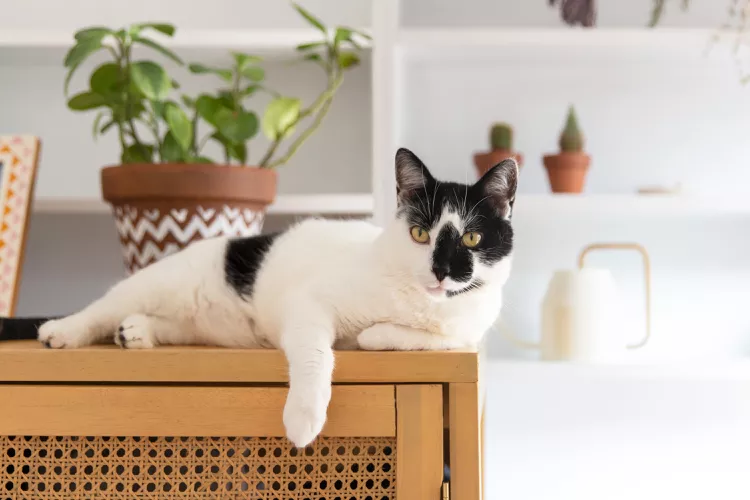Why Do Cats Like High Places?

If you've ever walked into your home to find your cat perched on top of the refrigerator, a bookshelf, or another high point in your home—and wondered what, exactly, she was doing—you're not alone. We all know there are a lot of, ahem, odd feline behaviors that aren't so easy to explain, but it turns out, perching from high points is a super common—and instinctual—behavior among domesticated cats.
So, Why Do Cats Hang Out in High Spots?
The answer is pretty simple: Cats have an instinctual need to observe their world from a high point because they're both predators to mice, birds, rabbits, and other small animals, and prey to larger animals, like coyotes, owls, or eagles. Not only does a higher vantage point give cats a better view of potential prey, but it also offers them some protection from larger animals—and, in theory, allows them to see a predator coming. What's more, back when our domesticated kitties' ancestors lived in forests and jungles, the leaves and branches of the trees they considered home also offered some camouflage from predators.
It's safe to say most domesticated cats aren't frequent hunters—aside from the occasional mouse or bird—and definitely aren't being hunted themselves. Their penchant for perching in high places, however, remains deeply ingrained in their biological and evolutionary makeup. You may find your cat loves to hang out on top of the refrigerator because:
- It allows her to keep an eye on her environment (and it's warm!)
- It gives her some private, calm space in a busy household
- It offers her protection from other cats, other pets, and young children
- It helps her avoid confrontation with other cats in the home
In households with multiple adult cats, lounging in the highest points can actually be somewhat of a status symbol—the cat with the "best" vantage point is typically considered the dominant cat. Having a number of high points in the home can help prevent conflict because each cat will have his or her own "designated" spot.
Why Your Home Needs Vertical Space for Your Cats
In addition to their instinctual urge to climb, domesticated cats simply enjoy climbing because it gives them mental and physical stimulation. (If you're a cat owner, you know a bored cat can become mischievous, and even destructive.) That's why it's so important to provide your cat with plenty of vertical space to climb, jump, and perch—and more so if you have multiple adult cats in your home. Remember: Cats' hierarchies are determined by vertical placement and height. The hierarchy can be flexible, but it is an important part of maintaining balance in your home's kitty society.
Fortunately, there are plenty of easy and affordable ways to provide vertical space for your cat:
- Consider buying or DIY-ing a cat tree or climbing post. There are so many types and styles on available on the market, you're sure to find a cat tree or climbing post that suits your cat's needs and fits your home's size and style.
- Install shelves or an entire shelving system on your wall. When you mount your shelves, try varying the spaces between them. This will challenge your cat to jump or climb from shelf-to-shelf. If you have an older or special needs cat, place the shelves closer to each other and lower to the ground.
- Add a window perch to your cat's favorite window. If your cat has a particular window she loves to look out, you can buy or a make a simple window perch for her to lounge on. Remember to always keep your windows closed and secured, so your cat can't escape.
- Maximize your floor plan. If you live in a smaller space like an apartment or condo, you can maximize your vertical space by installing shelving around the perimeter of a room, or by simply allowing your cat to lounge on your furniture, bookshelves, or refrigerator.
If you choose to install shelving or a window perch, be sure they're securely mounted to the wall with the proper anchors and covered in non-slip fabric. Any shelving should also be wide enough for your cat to safely take a snooze on.
Remember: You should never let your cat outside to climb on outdoor structures or trees. Allowing your domestic cat outdoors can be extremely dangerous, and even deadly.